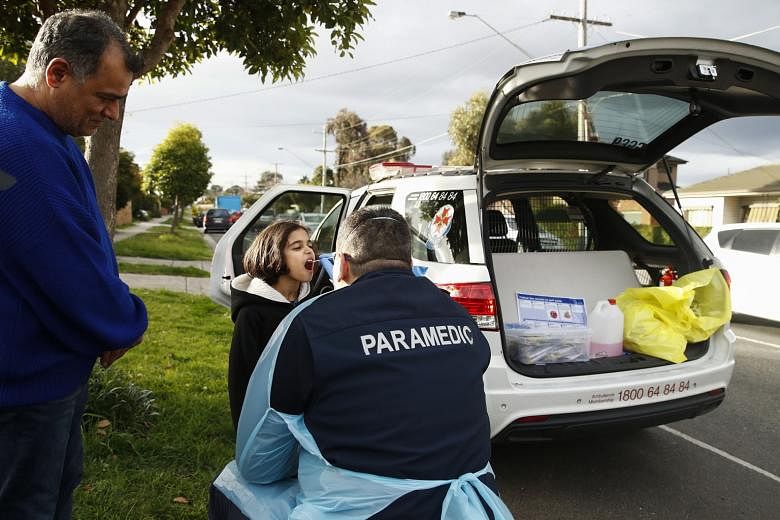Australian troops are descending on Melbourne, the country's second-largest city, to assist in combating the Covid-19 pandemic following a recent surge in cases.
Just months after the military was called out to help with the response to nationwide bush fires, it is being sent to the streets of Melbourne, the capital of Victoria. The troops will help provide medical support for testing sites in badly affected suburbs and with transporting overseas arrivals to hotels.
As the state prepares for a testing "blitz" over the next 10 days, the military will also help to transport samples from those who are tested to laboratories across Australia.
Australian troops on active duty are a rare sight in major cities. But the proposed deployment to suburban Melbourne appeared to cause little alarm, amid growing concerns that the state will have to reverse its recent loosening of restrictions.
A high-profile television presenter, Mr Karl Stefanovic, said on Channel Nine yesterday: "I think military presence on the streets is, for my mind, peace of mind."
Victoria state Premier Daniel Andrews requested the additional support from the military following the emergence of several Covid-19 clusters. More than 30 recent cases have been linked to two hotels in Melbourne, where a security guard and other staff contracted the virus and then possibly spread it to family members.
"We are all in this together," Mr Andrews said. "This is no less serious than a bush fire. I'm not too fussed what uniform people wear, and we're all working hard together to get this done."
Initially, more than 1,000 troops were expected to be deployed to Victoria following a request on Wednesday night by Mr Andrews to the federal government. But Victoria's government yesterday revised the immediate deployment to about 200 troops.
Australian Defence Minister Linda Reynolds said yesterday that the troops were "well trained and well prepared to deal with all of the required health measures".
"It's really important to note that the ADF (Australian Defence Force) has become very, very good at this," she told 3AW Radio.
The deployment, although largely well received, has been seen by some as evidence of the Victoria state government's failure to control the virus and oversee quarantine measures.
Outside Victoria, Covid-19 is largely under control and there is almost no community transmission.
All states have been winding back restrictions in recent weeks.
Yesterday, Victoria recorded 33 new cases, its highest daily number in weeks. New South Wales saw four new cases, and all other states and territories had none.
Mr Andrews expressed gratitude to Prime Minister Scott Morrison for providing the military support.
"I'm very grateful that he's agreed to provide ADF support in a number of areas, firstly medical teams to support with those really big testing sites, some other transportation support, particularly getting people from the airport to hotel quarantine," he said.
The government has deployed about 1,000 civilian staff to door-knock in about 10 badly affected suburbs. In the two worst-hit suburbs, Broadmeadows and Keilor Downs, reports say the state Premier wants to test half of all residents within the next three days.
The military personnel supporting Victoria's response will reportedly not be armed.
More soldiers may be deployed to assist with overseeing hotel quarantines and to support testing.
"They are not law enforcement and they're certainly not security guards," Ms Reynolds said. "What we're doing is supporting the Victorian authorities. If they identify a problem, they then refer it through to the Victorian law enforcement authorities to deal with."
Typically, the ADF has been deployed domestically during natural disasters.
Earlier this year, for instance, Mr Morrison called out more than 6,000 troops to assist with the nation's deadly bush fire emergency - the first deployment of reserve forces for a domestic disaster.
In April, the federal government launched a nationwide military operation to support the Covid-19 response. This has included assisting with contact tracing and mandatory quarantine arrangements.
In Sydney, capital of New South Wales, 102 troops have helped the police to oversee quarantining of international arrivals who are required to self-isolate for 14 days, mostly in hotels.
In the state of Queensland, about 380 troops have helped to protect Aboriginal communities and to patrol state borders, which have been shut.
Meanwhile, the surge in Victoria has prompted supermarkets to reimpose buying limits.
And New South Wales has advised people entering from Melbourne's hot spots to isolate for 14 days. It has also announced that tickets to sporting fixtures, which are resuming, will not be sold to people in Victoria.











